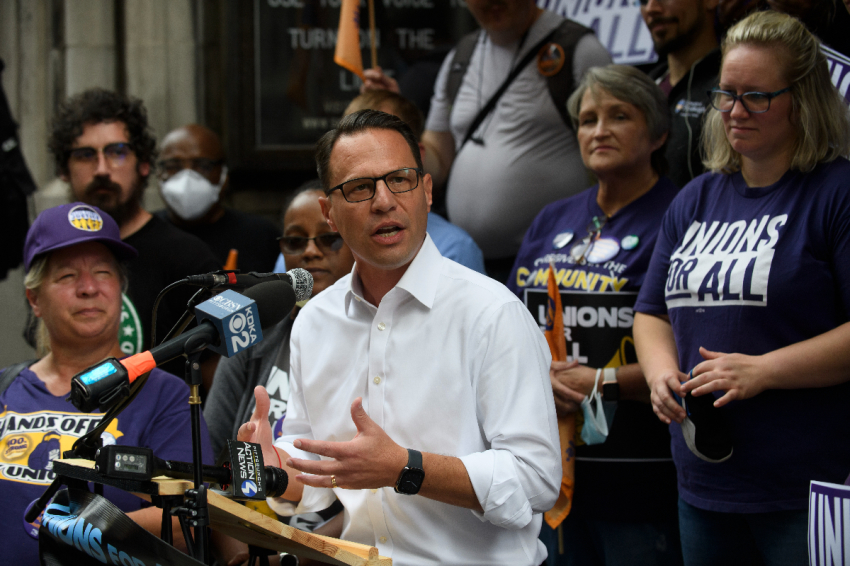Pennsylvania's Democrat gov. nixes school choice program despite campaign promise

Democratic Pennsylvania Gov. Josh Shapiro has vowed to line-item veto a school choice program despite previously expressing support for such initiatives during his gubernatorial campaign last year amid conflict in the state legislature over the budget.
The Pennsylvania House approved HB 611 Wednesday, a budget bill for the fiscal year 2023-24, following Shapiro's promise to veto a $100 million school voucher program approved by Republicans in the state Senate last week.
Shapiro issued a statement Wednesday, explaining he will strike the appropriation for the Pennsylvania Award for Student Success scholarship program from the budget bill via line-item veto because he was unwilling to hold up the entire state budget process due to partisan disagreements on the issue.
The PASS program would award a taxpayer-funded grant to eligible students enrolled in a failing public school to attend a private school.
Shapiro stated, however, that he and the state's legislative leaders will work on assessing educational programs in the future.
"This is just one of several initiatives important to me that have passed in one chamber but not the other — initiatives like statute of limitations reform, an increase in our minimum wage, commonsense gun safety legislation, and the Fairness Act," Shapiro stated. "It is incumbent upon leaders in both chambers to find ways to work together so that everyone's ideas are carefully considered and advanced through the legislative process and we can deliver for all Pennsylvanians."
"Our Commonwealth should not be plunged into a painful, protracted budget impasse while our communities wait for the help and resources this commonsense budget will deliver," he continued.
Several Pennsylvania Senate Republicans, including Senate President Pro Tempore Kim Ward, Senate Majority Leader Joe Pittman and Senate Appropriations Committee Chair Scott Martin, accused the governors of betraying a good-faith agreement in a joint statement.
"The Senate Republican Caucus worked diligently to pass a bipartisan budget. We negotiated in good faith and were eager to stand with Governor Shapiro on one of his priority campaign commitments — supporting school choice opportunities," the lawmakers stated.
"It is a shame the governor does not have enough respect and standing within his own party to follow through with his promise. Strong leadership requires the ability to bring people together, but instead we are met with Governor Shapiro's failure to deliver his commitment to empower parents and give children access to educational opportunities."
The lawmakers contend that all children in the state should have the opportunity to receive a "quality education."
Last month, Pennsylvania affiliates of the National Education Association sent a joint letter to the governor denouncing tuition voucher plans. The letter argued that the state has "a moral and constitutional responsibility to fund its existing system of public education."
Around the same time, Shapiro appeared on Fox News, stating that he believes the way to ensure every "child of God" has a chance at success is to provide them with quality education. However, the governor also clarified that he would not take money away from public schools to achieve that outcome.
The school choice movement has gained steam in recent years as some conservative states have enacted universal school choice laws. School choice advocates say the movement is growing amid discontent from parents who are at odds with public school officials over transparency and teachings on things like race and sexuality.
In July, Arizona adopted the most robust school choice law in the United States, which ensures all K-12 students in the state are eligible for scholarship funds. Families participating in the program can receive over $6,500 per year per child for private school, homeschooling, micro schools, tutoring, or other educational services outside the public school system.
In March, Arkansas passed a bill that requires the state to adopt a universal school choice program by the 2025-2026 school year. Under the bill, students who have disabilities, are facing homeless, attended a failing school in the previous school year, or have parents who are active duty military are eligible to receive vouchers known as "Educational Freedom Accounts" for the 2023-2024 school year.
In 2021, West Virginia enacted a bill establishing the Hope Scholarship Program in which recipients can receive funding that is "equal to 100 percent of the prior year's statewide average net share aid allotted per pupil based on net enrollment adjusted for state purposes."
As a Democratic gubernatorial candidate, Shapiro made headlines last year when he expressed support for some school choice programs, backing the Lifeline Scholarship bill that would allow parents with children attending failing schools power to reallocate their children's state education dollars.
"I'm for fully funding public education. I'm for making sure we give parents the ability put their kids in the best situation for them to be able to succeed," the then-candidate said in September 2022.
"And I'm for making sure we add scholarships like Lifeline Scholarships to make sure that that's additive to their educations. That it gives them other opportunities ... to be able to help them achieve success."
Samantha Kamman is a reporter for The Christian Post. She can be reached at: samantha.kamman@christianpost.com. Follow her on Twitter: @Samantha_Kamman



























